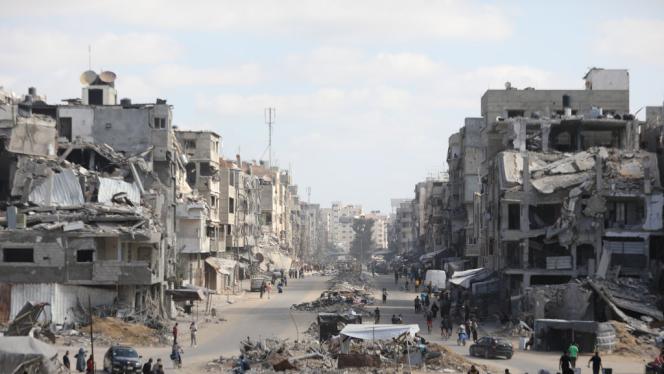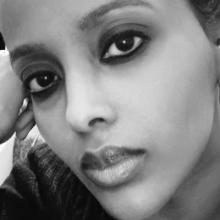Wednesday 16 October 2024
Gaza: one year on

Somali-Australian academic, Najat Abdi, reflects on the genocide in Gaza and how we navigate grief as Israel’s US-backed destruction of the Strip appears to have no end in sight.
No one knows how to process the first livestreamed genocide in history. I stopped trying months ago, when my friends were killed in Gaza. I write this as a campaign of mass extermination in northern Gaza continues, described by Palestine’s deputy ambassador to the UN as a “genocide within a genocide.”
For over 75 years, Palestinians have had to continuously show the world they’re being killed just to gain a modicum of attention—whether through a speech here or a protest there. Yet, it took October 7 – a coordinated military operation which breached an open-air prison – for the world to understand just how unsustainable nearly two decades of a siege and blockade was. You don’t need to be a seasoned analyst to know it would come to this. This is what colonised people do. Resist. And we are in absolutely no place or position to judge, nor suggest how they should. As Somalis the struggle for freedom and self-determination is one which we recognise.
I’ll never forget my first visit to Palestine. You remember the warmth of the Palestinians—a people who have endured so much, yet continue to resist with a stubborn hope and love for their land. A friend often tells me, “We just want freedom. Everything else can be worked out.” One also leaves Palestine with a sense of anger, especially after visiting Gaza.
The question, “What was Gaza like?” leaves me at a loss for words, especially after witnessing its total destruction over the past twelve months. It’s the use of the past tense that feels jarring; as if I’m frozen in a ‘deer in headlights’ moment, struggling to grasp that the world’s most densely populated strip of land no longer exists—a place with a history thousands of years older than the colony currently annihilating it. Wissam Nassar, a Gaza-based photographer who has long documented the Strip’s culture, reflects on what it looks like today: “Unfortunately, Israel destroyed everything beautiful in Gaza. Israel aimed to destroy not only people but also stones, infrastructure and historical buildings, wanting to eradicate human life and cultural heritage.”
We have not only witnessed a genocide, but also an epistemicide—the complete annihilation of systems of knowledge. All 12 higher education institutions have been destroyed, blown up by soldiers who habitually publicise their war crimes.
I’m told I need to properly mourn the friends I’ve lost—the friends who died with their families, the friends I promised I would see again soon, and the families of my friends who are still trying to survive. How does one process loss and grief when it is relentless? The truth is, you don’t. Eventually, numbness sets in.
Make no mistake, a genocide is happening because a people asserting their right to liberation, is a threat to the longest military occupation in modern history. A campaign of mass industrial slaughter is happening in the northern city of Jabalia as I write this, because residents have refused to leave.
If you’re after a treatise on the ‘nuances’ of Israeli settler colonialism, you won’t find it here. After returning from the West Bank and Gaza, seventeen years ago, I vowed to never centre the feelings or opinions of Israelis. Mainstream media already does this for us, while the people’s bodies under the rubble of buildings are a mere afterthought, when they aren’t dehumanised by the western press and officialdom who regurgitate Israel’s talking points about human shields.
This week, I watched some of the west’s most prominent writers go to great lengths to avoid using a racial slur against Ta-Nehisi Coates for daring to humanise Palestinians. White supremacy will always protect its structures and colonial outposts, and it will make entire populations pay for the crimes of European fascism—crimes they had no part in.
My late father once told me about the day he watched the collapse of Somalia on TV. He spoke of the tears in his eyes as he saw the streets of Mogadishu turn into a war zone. He also described the profound sense of abandonment felt by Somalis, as the world not only dismissed Somalia as an intractable “forever problem” but labelled its people “savages” the moment western troops came under harm.
The sight of state and governmental collapse in Somalia gave me an idea of what was to come after October 7. We all knew a response was assured. We knew it would be disproportionate. We knew it would be in line with Israel’s history of pummelling Gaza for nearly two decades.
But a genocide? This is where I believe we can no longer feign innocence. A 17-year blockade has isolated Gaza, leaving its two million inhabitants at the mercy of their colonisers. When Israel could control even the number of calories Palestinians were allowed to consume, it held the power to pull the proverbial rug out from under them at any moment—and it did. Starvation is a part of Israel’s arsenal which has been deployed to deadly effect.
This is also a western funded genocide, which makes us all complicit. No amount of protest or dissent within the State department has deterred Biden’s cold commitment to the extermination of Palestinians. “... the government’s an addict, with a billion dollar a week kill brown people habit,” says American rapper Brother Ali in one of his iconic verses.
Over the past 12 months I have met people who have come to this realisation almost every week. And it is a heartbreaking realisation that also should be grieved.
It isn’t lost on me that I have not mentioned Judaism once in this piece. People who commit a genocide belong to no religion and many Jews have been a critical part of the coalition of activists and intellectuals opposing the genocide. Naomi Klein has described Zionism as a “false idol” which uses Jewish suffering and biblical stories as “brutalist weapons of colonial land theft, roadmaps for ethnic cleansing and genocide.”
However, a Palestinian born into occupation is taught the apartheid and segregation they have endured aims to protect the “only Jewish state in the Middle East.” Joe Biden, the US president, has gone further and has repeatedly claimed that no Jew in the world would be safe without Israel. In 1986, he said if there were no Israel, the US would have to invent one. “It is the best $3 billion we make,” he told the Senate.
It should be no surprise then that the Palestinian right to self-determination is dismissed when it isn’t conflated with terrorism. A free Palestine doesn’t only threaten the apartheid regime between the river and the sea, it is also a threat to one of the US’s key outposts in the MENA region which is a pillar of its global hegemonic posture.
How can such a situation be sustained in the face of such an egregious violation of a people’s rights? The playbook is an old and familiar one. It has been employed for much of this century to justify the US’s own wars in the Middle East.
Palestinians are dehumanised, their faith portrayed as uncivilised, and their legitimate cause is conflated with a broader war against the west. Hamas in this version of the story is conveniently dismissed as an Islamist terrorist organisation and an Iranian proxy, rather than one of several Palestinian organisations fighting to liberate their land.
As a Muslim, this compounds the grief.
It has triggered a wave of Islamophobia across western countries in which Muslims are being harassed, their concerns about Gaza disregarded and their presence securitised from campus to the labour market. Reacting to the riots across the UK over the summer, one British MP drew a direct link between the UK government’s dehumanisation of Palestinians and the attacks on Muslims in cities across Britain. “The inhumanity being shown to one is giving ‘permission’ for the other,” Clive Lewis posted on X.
The 9/11 Islamophobia textbook has been dusted off and politicians and governing institutions are following the script with a lethal predictability. This is intended to muzzle the voices of those raising awareness of what the Biden administration and other western countries don’t want our societies to know.
According to the World Food Programme, no food has entered northern Gaza since the beginning of this month. The images and videos of malnourished children have appeared on most of our screens and this is happening on the doorstep of one of the world’s wealthiest societies. Aside from empty calls for Israel to allow more aid, the United States, its main benefactor, has refused to take further action to stop the assault and lift the siege, which is the root cause of all Gaza’s suffering.
Then again, we didn’t think Palestinians would have to record every waking moment of a genocide they are trying to survive. It speaks to the moral abyss we have entered.
How do you navigate this part of grief? One year on, I still don’t know.






